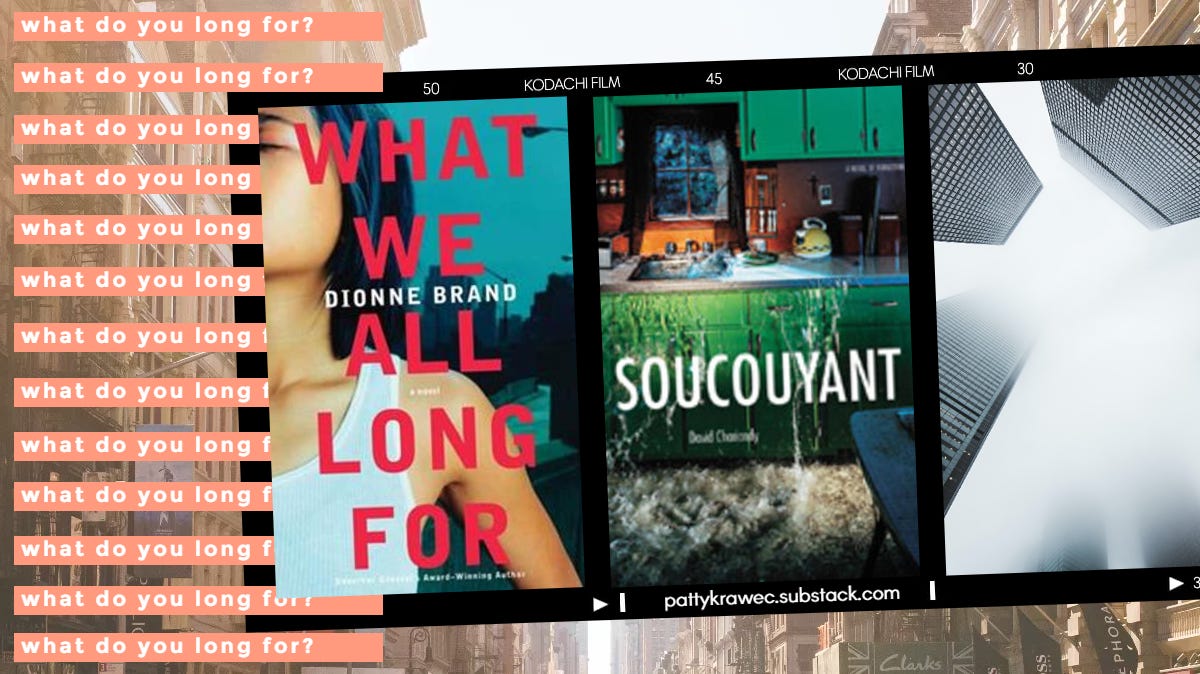Longing.
What do you long for?
I went on vacation last week and grabbed two fiction books off my shelf without thinking very much about them. Dionne Brand I know I need more of in my life so I took What We All Long For, and I’d picked up David Chariandy’s book Soucouyant a few years ago but haven’t read it so I brought that too. They actually combined really well. But maybe I’d say that about anything that followed Brand’s book about a lost son, three friends, and the longings they hold for lives and family, the past and the future. Because so much of writing is about the things that we long for. My own book, Becoming Kin, is about longing. The human condition is infused with it.

What do you long for?
There is a beautiful piece at the beginning of Brand’s book that takes place on Monday morning subway car. She writes about how we shape each other, the way a conversation between strangers will stay with us and become part of us. The sandpaper of our lives on each other, creating subtle changes in us. The chance that floats in the air. And even in the midst of all this, a novel that isn’t about Indigenous people we are there. Brand comments that all of them, these people from everywhere sitting on a Monday morning subway car, are on Ojibway land although they may not think about it. And from this wide angle she narrows in on three friends and a lost brother, narrows in on their longings.
What do you long for?
A soucouyant is a creature from Trinidadian folklore: a shapeshifting blood sucking hag who appears to be an old woman but at night casts off her skin and sucks the blood of sleeping victims. If she takes too much, her victim may die or be themselves transformed. Chariandy’s book is about a son and a mother with dementia and the young woman who cares for her when the son leaves her alone. The dementia is rooted in trauma, the monster in his mother’s past took so much from her that she was transformed and the son fears what she has become. So he flees and another steps in to care for her.
The longing in these books is palpable.
What do you long for?
I read them while bobbing on a boat in the Caribbean. Don’t come at me, I know the many evils of these blood sucking monsters but we do things for our parents. And so I went. And I thought about monsters who look like old women and sandpaper lives and all the ways that migrations are forced and the longings that are a constant flow beneath the surface. I thought about the longings of the passengers and the staff, the longings of the people on shore pushing items for sale at me while I drank Corona, and the longings of the people our cab passed on our way back to the ship and all the ways that we are insulated from the consequences of others until we come to believe in our own innocence.
Yes, the young woman who took our breakfast dishes was working long hours but it was better than what she has at home. Why are things so bad at home mom? They shouldn’t treat their staff so poorly, I treat them with respect. We don’t treat them badly mom, but we benefit from those who do, who insist on their obsequiousness. Of course I gave them a 10 star rating, and I also said no, nobody asked me to rate them highly. I won’t narc on workers. Not even if the grocery store promises me a chocolate bar to let them know my cashier failed to ask me a question or offer me something.
What do you long for?
In tiny letters in the top right of Chariandy’s book, in font so small that I only just now noticed them, it says “a novel of forgetting.” This of course makes me think of my own book’s subtitle, unforgetting. Remembering is fun. Our middle son Max came with us on this vacation, his first and last cruise he says, and we spent a lot of time remembering when the boys were younger, when I was younger, when my parents were younger. It’s always nice when the memories line up, when we remember the same event the same way. Unforgetting isn’t remembering. Remembering is going through old boxes with fondness, holding my grandfather’s old handkerchiefs to my nose to see if I can still smell him (I can). Stroking the scrap of fur that Max used to carry around and called bunny. That’s remembering. Unforgetting is messy and requires pulling up floorboards, stripping wallpaper. So when Chariandy calls his book a novel of forgetting that’s what I think about. The deliberate covering up of things best not spoken of. The pain of forgetting of what we love, so that we can forget other pain. That forgetting is a soucouyant that sucks our memories along with our blood.
Brand’s book is also filled with that deliberate covering up. Brothers and parents and histories remembered but also unspoken, trapped and hidden. Maybe that’s where the longing comes from, it leaks out from the floorboards and wallpaper. No matter how hard we try to forget, we can’t. And memories leak out like longing, longing for the things we deny ourselves because it would be too painful otherwise. The two women who find joy in Oku’s cooking even though he prepares the things they have rejected from their mothers.
What do you long for?
What do you long for?
Tugyen asks this question of complete strangers, writing them down in her notebook so that she can use them in an art installation and now I ask you.
What do you long for?
Longing
an accidental pairing
